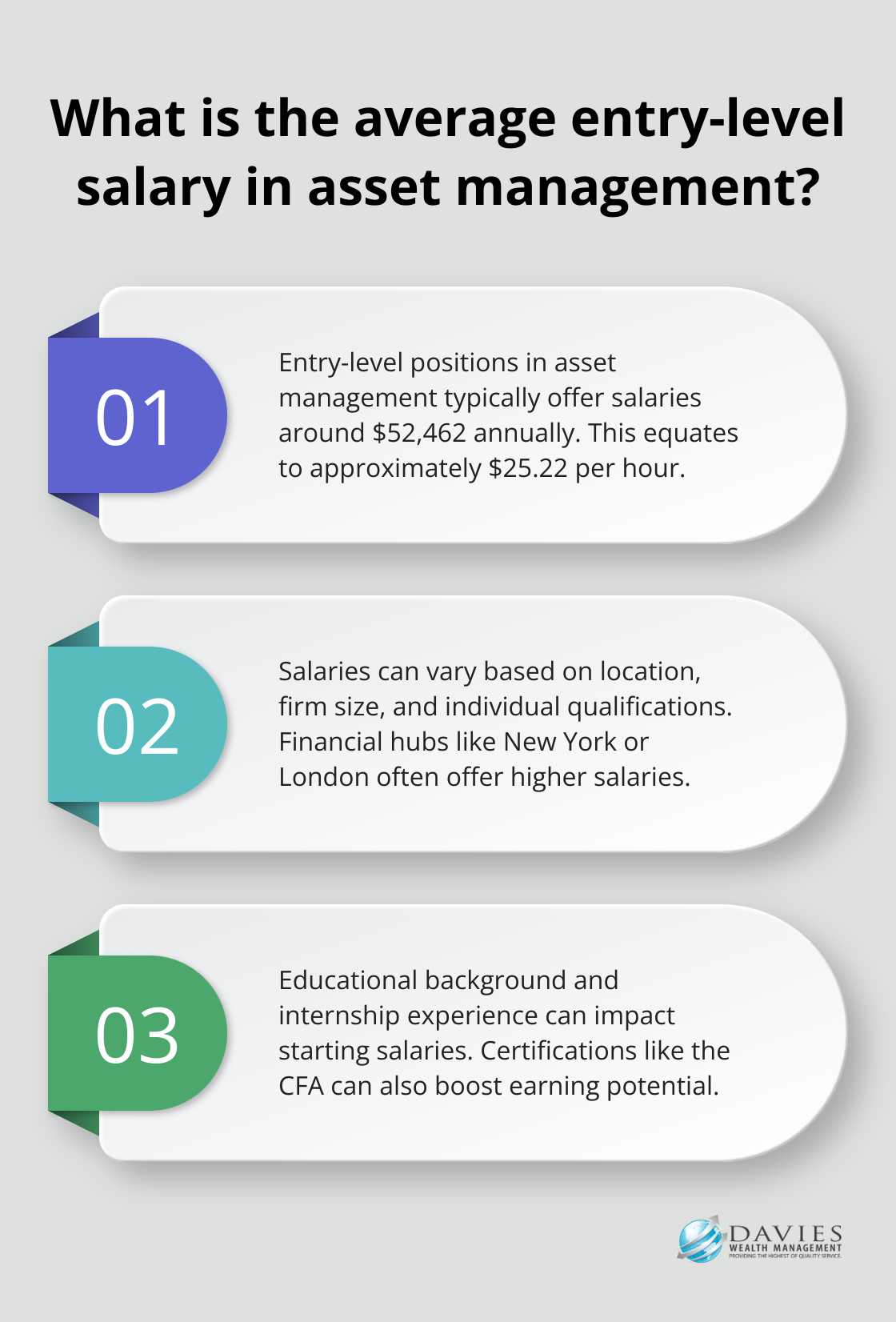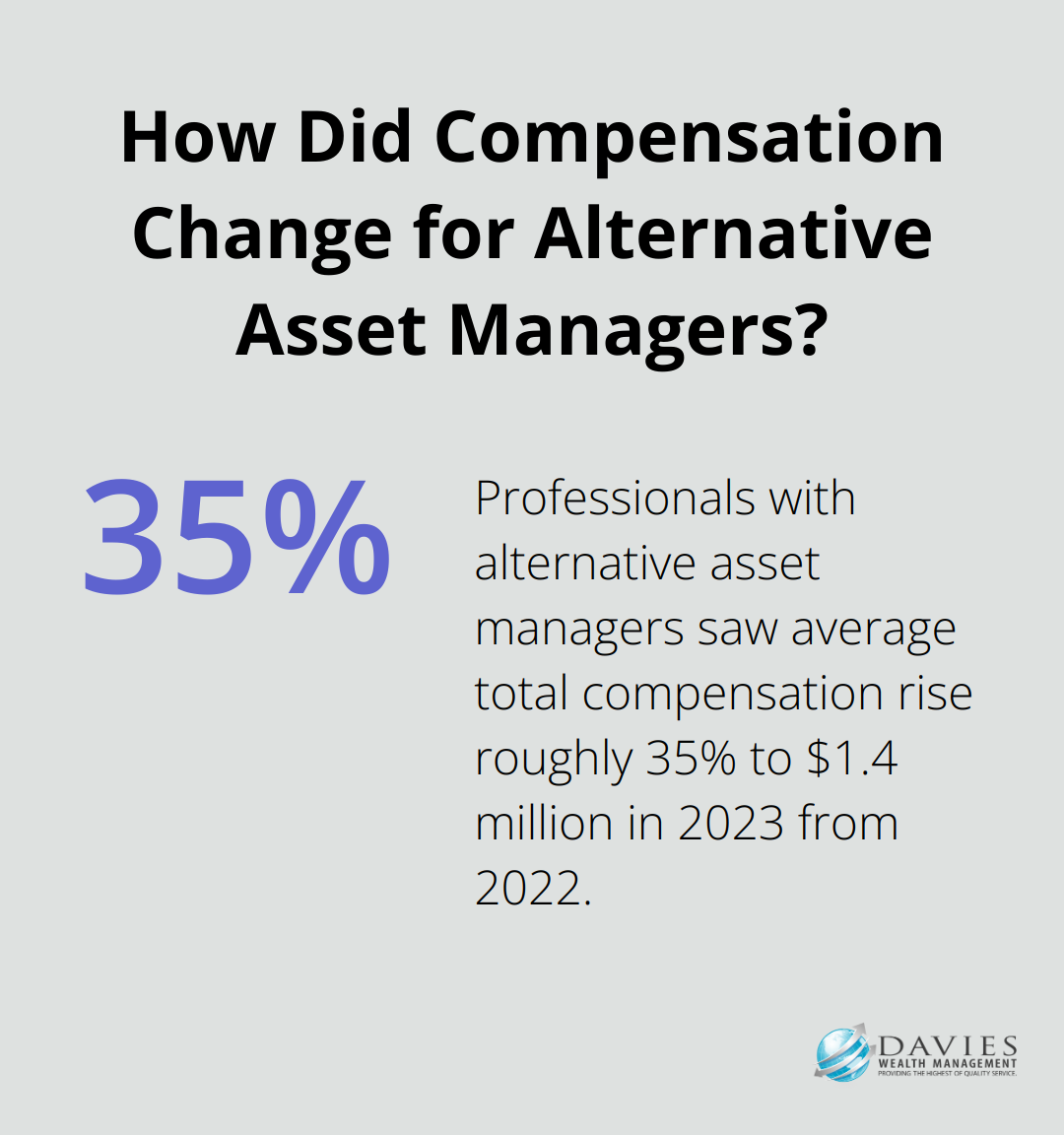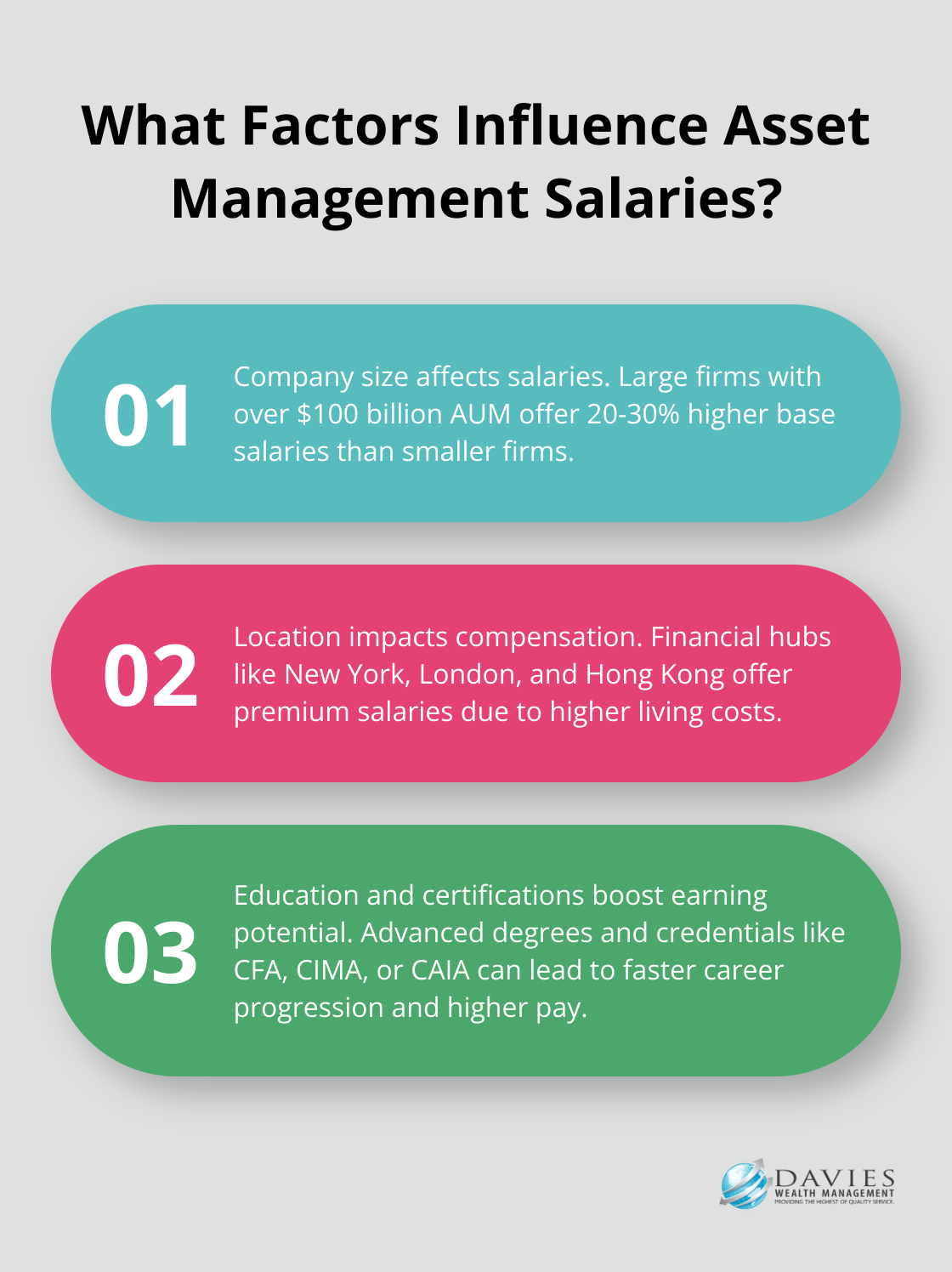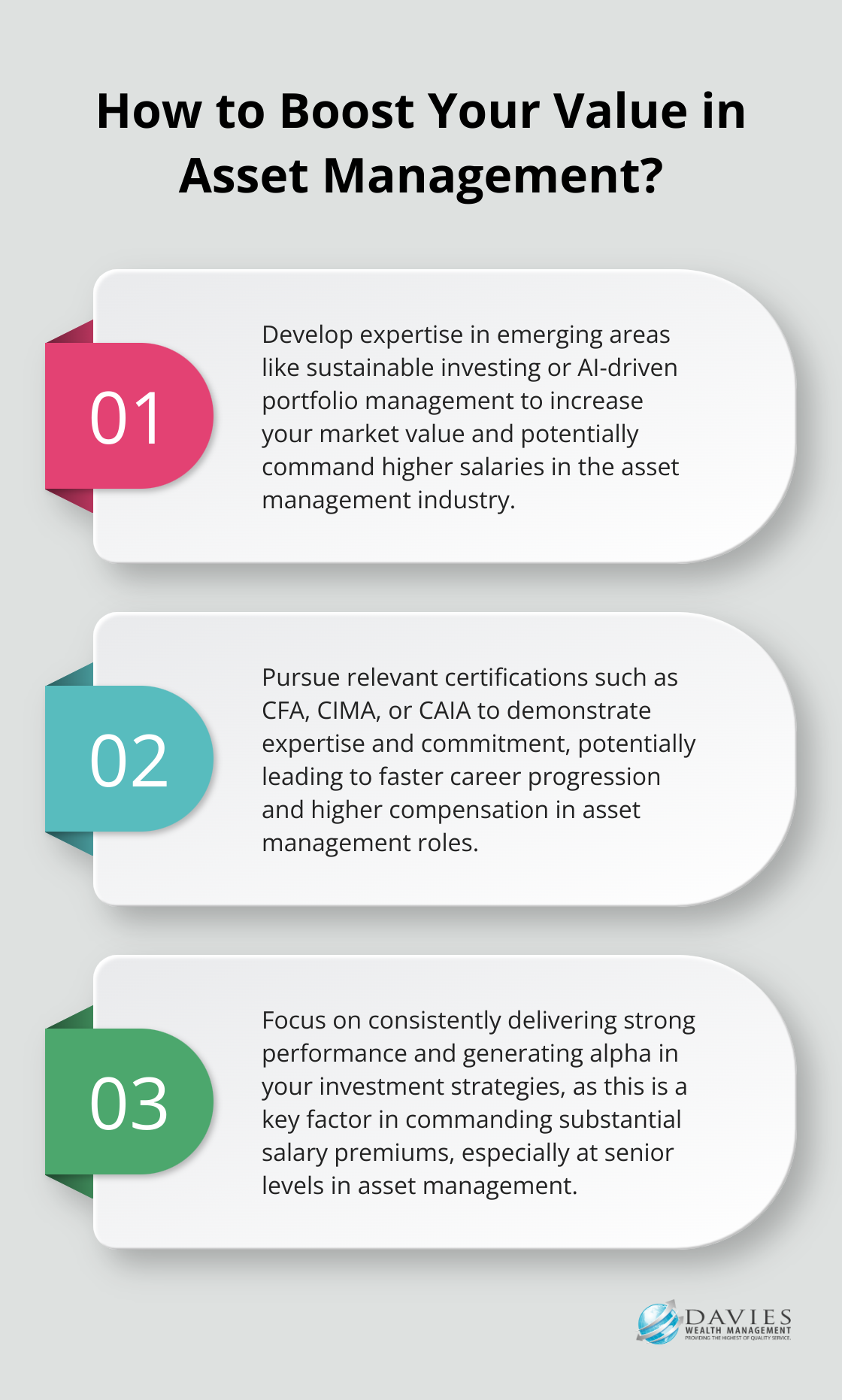At Davies Wealth Management, we understand the importance of financial planning, including tax-efficient investing and career considerations in the finance sector.
Asset management is a lucrative field that offers diverse opportunities for professionals at various career stages. Understanding salary expectations in this industry is crucial for those considering or advancing their careers in asset management.
This blog post will explore the salary ranges for different positions in asset management companies, from entry-level to senior roles, and discuss the factors that influence compensation in this dynamic field.
Starting Your Career in Asset Management
Entry-Level Roles and Responsibilities
Asset management offers exciting opportunities for those entering the finance industry. Most professionals start their asset management careers as analysts. These roles involve research, financial data analysis, and support for senior team members in investment decisions. Analysts often specialize in specific sectors or asset classes, developing deep expertise that becomes invaluable as they progress in their careers.
Salary Expectations for New Entrants
Recent industry data shows that entry-level positions in asset management typically offer salaries around $52,462 annually or $25.22 per hour. However, this can vary significantly based on location, firm size, and individual qualifications. Positions in financial hubs like New York or London often command higher salaries to offset the higher cost of living.
Factors Influencing Starting Salaries
Several factors can impact your starting salary in asset management:
- Educational Background: Graduates from top-tier universities often command higher starting salaries.
- Internship Experience: Previous internships can give candidates a significant edge, both in landing a job and negotiating a better salary package.
- Certifications: While not always required for entry-level positions, having or pursuing certifications like the Chartered Financial Analyst (CFA) designation can boost your earning potential. Many firms value these credentials as they demonstrate a commitment to the field and a strong foundation of knowledge.
- Firm Size and Prestige: Larger, well-established firms often offer higher base salaries, while smaller boutique firms might offer lower base pay but potentially higher bonuses or profit-sharing opportunities.
Work-Life Balance Considerations
It’s worth noting that while starting salaries in asset management might be lower compared to some other finance sectors (like investment banking), the work-life balance is often better. Many professionals in the field report working around 40-50 hours per week, which is considerably less than the grueling hours often associated with investment banking roles.
Career Growth Potential
As you start your career in asset management, keep in mind that your starting salary is just the beginning. The field offers significant potential for salary growth as you gain experience and prove your value. Many professionals rapidly advance their careers and earnings by consistently delivering strong performance and building their expertise.

The next chapter will explore the salary expectations and career paths for mid-level and senior positions in asset management, providing a comprehensive view of the financial rewards this industry can offer throughout your career.
Advancing Your Career: Mid-Level and Senior Positions in Asset Management
Portfolio Manager and Senior Analyst Roles
Portfolio managers oversee investment strategies and make key decisions about asset allocation. They manage teams of analysts and bear responsibility for fund performance. Senior analysts conduct in-depth research and provide critical insights to inform investment decisions.

Professionals with alternative asset managers saw average total compensation rise roughly 35% to $1.4 million last year from 2022, according to a 2024 report.
Compensation Structures for Experienced Professionals
At mid to senior levels, compensation packages become more complex and often include a significant variable component. A typical structure might include:
- Base Salary: This forms the foundation of the compensation package.
- Annual Bonus: Often tied to individual and fund performance.
- Long-Term Incentives: These can include stock options, restricted stock units, or participation in carried interest for private equity firms.
Performance-Based Compensation and Bonuses
Performance measurement is an important tool in the investment management process, as it answers the what, why, and how of past performance.
For instance, a portfolio manager with a base salary of $200,000 might receive a bonus of $100,000 to $400,000, bringing their total compensation to $300,000 – $600,000 or more. Exceptional performers who manage large funds or generate significant alpha can see their total compensation exceed $1 million annually.
It’s worth noting that bonuses fluctuate greatly and depend on factors such as fund performance, assets under management (AUM), and overall firm profitability. During challenging market conditions, firms may reduce or eliminate bonuses.
Career Progression and Earning Potential
As professionals climb the career ladder, their potential for substantial compensation increases grows. Chief Investment Officers (CIOs) at large asset management firms can earn total compensation packages in the millions.
Within alternative asset management firms, bonuses are slated to be in a range from flat to 5% in 2024, according to a report by Johnson Associates.
However, reaching these senior positions requires not only exceptional performance but also strong leadership skills, strategic thinking, and the ability to navigate complex market conditions.
Industry Trends and Future Outlook
The asset management industry continues to evolve, with new trends shaping career paths and compensation structures. The rise of passive investing, increased focus on ESG (Environmental, Social, and Governance) factors, and advancements in technology all impact the skills and expertise required for success in this field.
Professionals who adapt to these changes and develop expertise in emerging areas (such as sustainable investing or AI-driven portfolio management) may find themselves in high demand, potentially commanding premium salaries.
As we move forward, the next chapter will explore the various factors that influence asset management salaries across all career levels, providing a comprehensive view of what shapes compensation in this dynamic industry.
What Drives Asset Management Salaries?
Company Size and Location Impact
The size of an asset management firm significantly affects salaries. Large, established firms with substantial assets under management (AUM) typically offer higher base salaries. A portfolio manager at a firm with over $100 billion in AUM might earn 20-30% more than a counterpart at a smaller firm managing $10 billion.

Location plays a pivotal role. Financial hubs like New York, London, and Hong Kong command premium salaries due to higher living costs and intense competition for talent.
Education and Certifications: The Success Foundation
Advanced degrees like MBAs from top-tier institutions can significantly boost earning potential. CFA charterholders earn different median compensation based on position, experience, country, and state.
Certifications such as the Chartered Financial Analyst (CFA), Certified Investment Management Analyst (CIMA), or Chartered Alternative Investment Analyst (CAIA) can lead to salary premiums. These credentials demonstrate expertise and commitment to the field, often resulting in faster career progression and higher compensation.
Experience and Performance: The Ultimate Differentiators
Industry experience and a proven track record of performance are perhaps the most significant factors affecting salaries in asset management. Professionals with a history of generating alpha (returns above the benchmark) or successfully managing large portfolios can command substantial premiums.
A senior portfolio manager with 10+ years of experience and a strong performance record might earn two to three times more than a manager with similar experience but average performance. This disparity becomes even more pronounced at the highest levels, where top-performing fund managers can earn multi-million dollar packages.
Industry Trends and Specializations
The asset management industry continues to evolve, with new trends shaping career paths and compensation structures. The rise of passive investing, increased focus on ESG (Environmental, Social, and Governance) factors, and advancements in technology all impact the skills and expertise required for success in this field.
Professionals who adapt to these changes and develop expertise in emerging areas (such as sustainable investing or AI-driven portfolio management) may find themselves in high demand, potentially commanding premium salaries.
Final Thoughts
Asset management offers a rewarding career path with significant earning potential across various levels of experience. Entry-level positions typically start around $50,000 to $70,000 annually, while mid-level professionals can expect salaries ranging from $100,000 to $250,000. Senior positions, such as portfolio managers and executives, can command compensation packages well into the millions, especially when factoring in performance-based bonuses and profit-sharing arrangements.

The career growth potential in asset management is substantial, with opportunities for rapid advancement based on performance, expertise, and market conditions. Professionals who progress often manage larger portfolios, lead teams, and take on more strategic roles within their organizations. This progression typically accompanies significant increases in compensation and responsibilities.
At Davies Wealth Management, we understand the importance of ongoing education and professional development in the financial services industry. Our team of experts stays at the forefront of investment strategies and wealth management techniques (including tax-efficient investing) to provide our clients with effective financial solutions. Whether you start your career in asset management or look to take your financial planning to the next level, Davies Wealth Management offers the expertise and personalized service to help you navigate your financial journey.



Leave a Reply